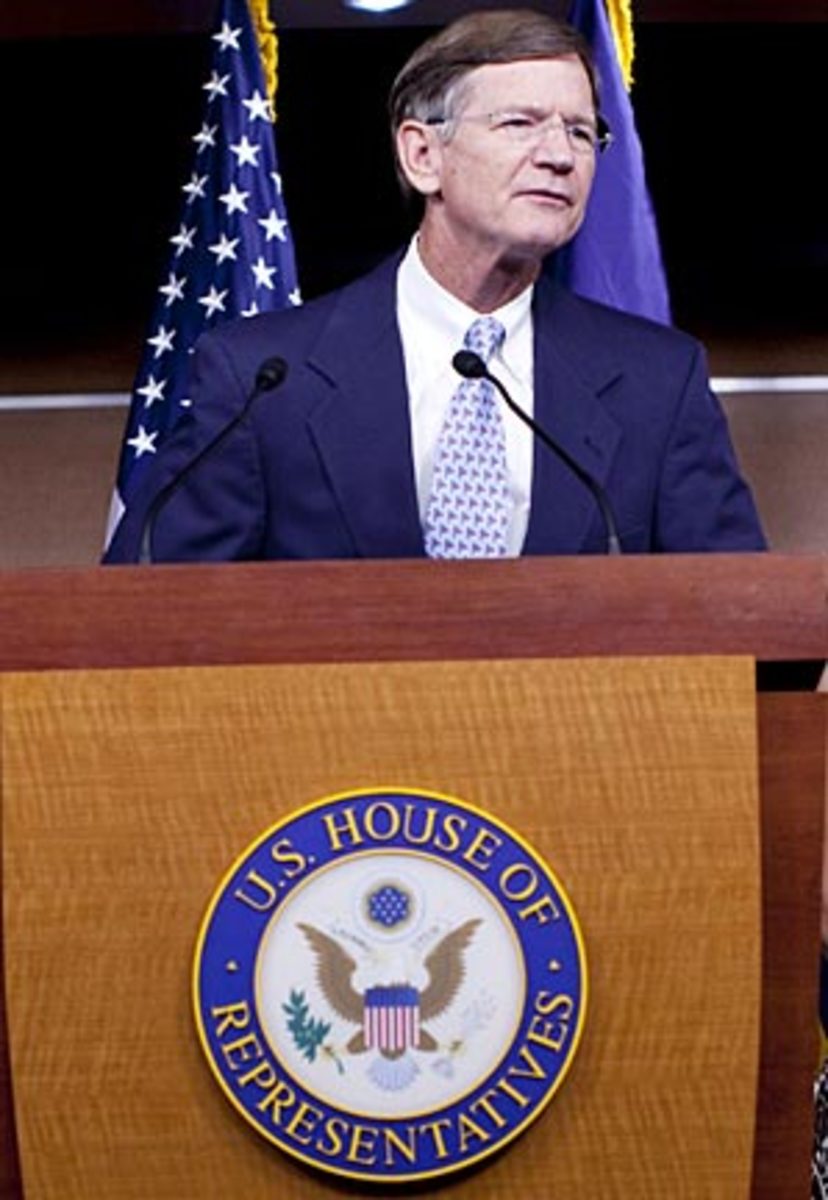NFL's political action committee has doled out $876,857 in 2012
The NFL just hit the midseason mark with a handful of players in the running for Most Valuable, but the league has already decided their Most Valuable Politicians.
Lamar Smith, the Republican Congressman representing Texas's 21st congressional district, and Peter Olson, the Republican Congressman for Texas' 22nd congressional district, have each received $25,000 in political contributions from the nascent political action committees of the NFL, the most of any lawmakers on Capitol Hill.
They are among the 217 politicians who received a cut of the $876,857 doled out by the NFL's Gridiron PAC and of the $541,000 distributed by Major League Baseball's Political Action Committee in 2012, according to data provided by the Center for Responsive Politics (CRP). Neither the NBA nor the NHL have PACs.
"Sports franchises and leagues have issues ultimately decided by politicians," says Dan Schnur, director of the Jesse M. Unruh Institute of Politics at the University of Southern California. "If Congress holds a hearing about concussions, it makes just as much sense to have relationships with members of Congress as it does for any other business."
Few issues are more pressing for the NFL than concussions -- at least judging by the league's political spending. The House Judiciary committee held hearings in 2009 and 2010 about the NFL's concussion crisis. Of the 41 members of the Judiciary committee that convened the hearing, 24 received Gridiron PAC contributions. When a new Congress met in 2011, 22 of 39 members received NFL funds. The league also poured substantial resources into lobbying lawmakers about head injuries and retirement and disability issues, spending $1.62 million in 2011 and $840,000 so far this year.
An SI.com analysis of Federal Elections Commission data revealed the NFL spent most on members of the House Energy and Commerce Committee ($231,710) and House Judiciary ($175,500). Most issues facing sports leagues, from drug testing to antitrust issues, fall under the purview of one of these two committees -- and the recipients of the largest contributions are frequently ranking members or the chairperson of their respective committee.
Smith's financial windfall is most likely because he serves as chairman of the crucial House Judiciary Committee, according to industry experts. At the first concussion hearing in October 2009, Smith told the panel: "the NFL does not need Congress to referee this issue. . .We cannot legislate the elimination of injuries from the games without eliminating the games themselves," Smith's re-election committee received a $5,000 campaign contribution from the NFL's nascent political action committee three weeks earlier. Olson, on the other hand, is a key member of the Energy and Commerce committee.
Schnur cautions, however, against drawing a straight line between the PAC's contribution and a politician's position. "When someone gives money to a politician, they're not buying that politician's position but access," he says. "That contribution is not changing anyone's mind but it allows you to make your case."
The lawmakers who received financial funds may be just as telling as those who did not. Representative Linda Sanchez, a Democrat from California, who called the league's concussion efforts a "charade," did not receive funds. Neither did Representative Maxine Waters, a California Democrat and wife of former NFL linebacker Sid Williams, who suggested Congress strip the league's antitrust status because of its handling of concussions.
Sanchez's persona non grata status didn't carry over to the majors, which gave her $10,000. She was one of 15 lawmakers to receive $10,000 -- the most given out to individual politicians by the league. MLB's lobbying efforts reveal an interesting shift in its interests. The league's lobbying dropped from a $1.3 million in 2004 -- the height of the steroid era and the beginning of Rafael Palmeiro's pointed finger and Roger Clemens misremembering -- to $250,000 in 2012. The Center for Responsive Politics database shows baseball hasn't lobbied on the steroids this year, suggesting MLB officials believe the issue is behind them. Representative Henry Waxman, who led the steroids hearings, received $10,000 from the league's PAC.
Other interesting tidbits:
• NFL Commissioner Roger Goodell, son of the late Senator Charles Goodell (R-NY), recently gave Arizona Republican Congressman Ben Quayle $2,500 and Maryland Democratic Senator Ben Cardin $1,500, his two biggest recipients, according to Federal Election Commission records. His counterpart, baseball Commissioner Bud Selig did not contribute to any individual candidate in 2012, according to the FEC.• The Gridiron PAC and MLB's PAC tossed a combined $15,000 to Massachusetts Senator Scott Brown as he attempts to fend of Democratic challenger Elizabeth Warren
• Missouri Senator Claire McCaskill, a Democrat, received a combined $15,000 from the two leagues. McCaskill is in a high-profile race against Republican opponent Todd Akin, who made controversial comments about rape earlier this year.
• Federal campaign laws prohibit the Toronto Blue Jays, MLB's only foreign franchise, from contributing to the league's PAC.
• The spending by both leagues is nearly evenly divided between Democrats and Republicans, according to CRP data. The Gridiron PAC provided $207,500 dollars to Democrats in the 2012 election cycle and $220,500 to Republicans. Dems received $174,500 from the MLB PAC while Republicans collected $159,500. The fairly even split between parties is strategic, says Schnur, since neither party holds a significant majority in either chamber. "It's helpful to have access on both sides of the aisle," he says.






